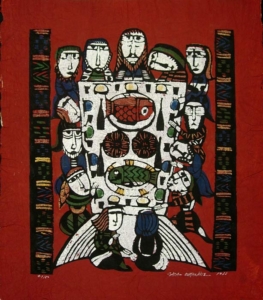Maundy Thursday Sermon
A New Passover into God’s Justice
The Rev. David Ames
What is significant about this day referred to as Maundy Thursday, and the Passover time of remembrance and festival to the Lord, is that these events serve to bring Jews and Christians together in our respective histories.
Image: Sadao Watanabe, Last Supper
In addition to this important day in Holy Week, we are in the middle of the week of the Jewish observance of Passover. The account of Passover in the Book of Exodus tells us that “this day shall be a day of remembrance for you. You shall celebrate it as a festival to the Lord; throughout your generations you shall observe it as a perpetual ordinance.”
What is significant about this day referred to as Maundy Thursday, and the Passover time of remembrance and festival to the Lord, is that these events serve to bring Jews and Christians together in our respective histories.
In the biblical account of Passover, God instructs Moses and Aaron in the liturgical rite of the Passover lamb and how they are to eat it. The sacred meal takes place in the Mesopotamian month of Nisan, which occurs in the springtime and coincides with our months of March or April.
The Israelites were instructed to roast the Passover lamb “over the fire with unleavened bread and bitter herbs.” It was an open fire of a semi-nomadic people, a people who were on the move when they needed to be. It was their custom to use unleavened bread and the wild plants of the desert to flavor the meat. God commanded that they eat this meal with “your loins girded, your sandals on your feet, and your staff in your hand; and you shall eat it hurriedly. It is the Passover of the Lord.”
So Jesus and his disciples gathered in the Upper Room to celebrate the Passover. It was “a day of remembrance” of God’s deliverance from Pharaoh’s oppression. But the disciples soon discovered that this particular Seder meal was not an ordinary Passover celebration.
The Gospel of John places this event at a time of preparation “before the festival of the Passover.” As the evening meal was taking place Jesus “got up from the table, took off his outer robe, and tied the towel around himself. Then he poured water into a basin and began to wash the disciples’ feet.”
The biblical scholar Gail O’Day has discussed the meaning of this intimate event of foot washing: “Jesus does not simply issue a general call for service; he issues a specific call to give as he gives, to love as he loves. The foot washing [in the gospel story] …is about entering into relationship with Jesus by receiving his gesture of hospitality…. One can follow Jesus’ example only if one has already experienced Jesus’ loving service for oneself. The call…is to embody the love and service of Jesus for one another.” The washing of feet represents the love that Jesus showed for “the least among us,” our fellow human beings who are poor, oppressed, or marginalized.
What made this meal so significant in addition to washing the disciples’ feet was what Jesus did as they gathered for supper. Instead of allowing each person to drink from his own individual cup, Jesus passed his cup around the table for all to share. In Jewish meals it was the custom for the host, or the presider of the meal, to pass his cup to someone upon whom he wished to bestow a special honor. It allowed the person being honored to share in the blessing the presider had said over the cup. Jesus shared his cup with all of his disciples. What this means for us and for all the followers of Jesus is that it enriches our understanding of the Last Supper and what happens in our sharing the bread of heaven and the cup of salvation.
Jesus was in an intimate relationship with his disciples. Tonight we are in a special relationship with Jesus through our celebration of Holy Eucharist. It is the central act of our worship, a communal meal of thanksgiving to God. We follow the sacred formula of taking bread and wine, offering thanks to God, breaking the bread and offering the cup, eating or drinking, and doing these acts “in remembrance” of Jesus. These acts, and sharing the body of Christ are strong testimony to the importance of community. There can be no discrimination, those who offer “thanksgiving” to God as a community are to be united in love. Love and service in the community is the meaning of the sacrament of Eucharist.
When we say in the Lord’s Prayer “Give us today our daily bread,” it is a reference to the need to feed all people, especially those who are poor and hungry, those who are different, and those who suffer from economic hardship or the Covid-19 pandemic. In this sense the Last Supper, the celebration of Eucharist, is a New Passover from bondage to liberation. It is the path that leads through death to new life, from the deathly consequences of human injustice to the compassionate new life of God’s justice.
The death of Jesus represents a complete and selfless act of love. As the early Christians did, and as all Christians through the ages have done, we remember Christ’s self-giving love in the action of celebrating the Eucharist. And while we wait for his coming again in glory, we are to treat one another and all whom we meet with selfless love and compassion. May we move through the deathly path of our human injustice and follow the path of transformation into the new life of God’s justice. Amen

